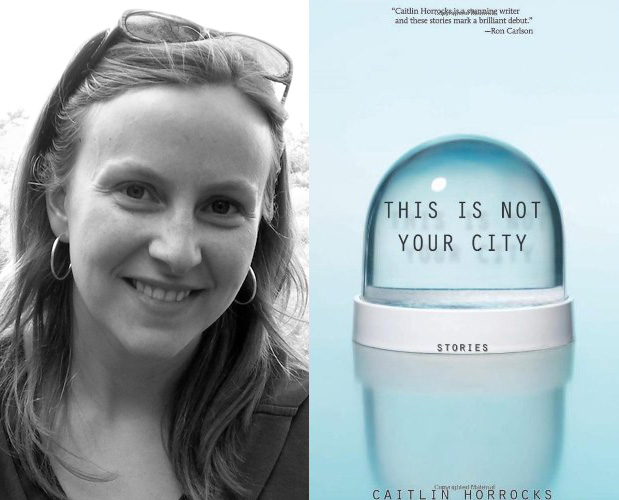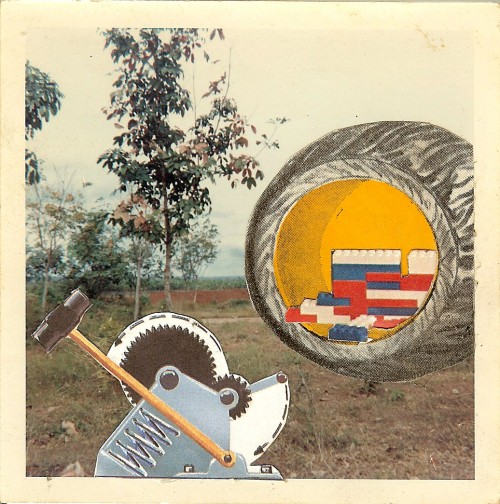On god, Michele Bachmann, and BSG
I’ve been thinking about God lately. Or, I’ve been thinking about how God is used and abused in speeches, especially of the political nature. The other day, as I was finishing up Season 2 of Battlestar Galactica, I saw Michele Bachmann’s Iowa straw poll victory speech. Think what you will of Bachmann, in her excitement and adrenaline, she demanded, “God bless America!” and “God bless you!” at least a dozen times within a few minutes. I use the word “demanded” purposefully. Somewhere along the way, we as an English-speaking people went from asking or requesting that God bless us – “May God bless you” – to commanding this omnipotent, omniscient powerhouse to bless us. Whereas the omission of “May” may be a simple elision, that is, it was just more convenient for us to drop the “may” in order to be more efficient with our time. One syllable can make a difference.
I Am A Very Productive Entrepreneur
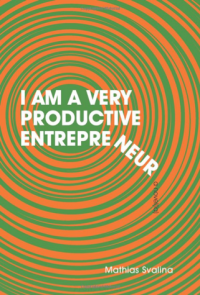 I Am A Very Productive Entrepreneur
I Am A Very Productive Entrepreneur
by Mathias Svalina
Mud Luscious Press, 2011
67 pages / $12.00 Buy from Mud Luscious Press
Rating: 8.7
When I received Mathias Svalina’s novella, I Am A Very Productive Entrepreneur in the mail, I didn’t quite know what to expect. I tore open the padded manila envelope and found myself staring at a green and orange cover with the words “a novel(la)” printed on it. Ok. Then I did a preliminary flip through of the book and didn’t see a novella at all. The book seemed to be filled with short poems, prose poems and pieces of what some would call flash fiction. Ok. I was hoping the book wasn’t going to be some failed attempt at “experimental fiction.” But, coming from Mud Luscious Press, I wasn’t exactly surprised that this book was, at first impression, well, weird. J.A. Tyler and his Mud Luscious Press have been putting lovely oddities into the world for a few years now, and I Am A Very Productive Entrepreneur stayed the Mud Luscious Press course, and did not disappoint.
August 18th, 2011 / 12:44 pm
I Like Caitlin Horrocks A Lot
This Is Not Your City (Sarabande), the debut short story collection from Caitlin Horrocks, was released in July. The New York Times called the book “appealingly rugged-hearted” in its review and other critics have been equally favorable. Caitlin’s writing has appeared in Best American Short Stories 2011, Tin House, The Paris Review, One Story, Prairie Schooner, Blackbird, and many other fine magazines. She teaches at Grand Valley State University. I read Caitlin’s book several times this summer and what stood out about this collection was the diversity of voice, point of view, form, and style. No two stories were alike and the collection contains what may become my favorite short story of all time, “Embodied,” about a woman who has lived 127 lives. In my review, forthcoming elsewhere, I write about how Horrocks is not a writer you’d typically see named as an experimental writer. This collection, however, makes a strong case for her inclusion in that category because of the subtle but innovative experiments she tries with the eleven fine stories in a very strong collection. Over the course of a few weeks, we had a great conversation about writing toward emotion, what it means to be a Midwestern writer, and much more.
Haut or Not: Spencer Madsen
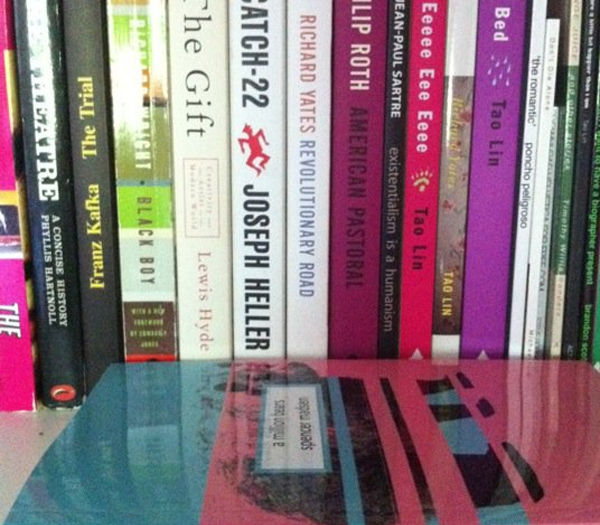
I don’t know what’s worse: the racism in Black Boy, the paradoxical ingrown logic of Catch-22, or the unnamed impenetrable authority in The Trial. For a bro into dystopia, you ain’t seen a fucked up situation until our poor couple in Revolutionary Road shows us the bloody way. Looking at my browser’s recent history feels like my “resent history,” all the facebook albums of parties I never went, people in tighter-looser clothes and sexier-grainier lighting. And if low res camera phones are our muse, may she render the contemporary “indie” authors implicated to the right of the shelf — each spine thinner and thinner as the thinning of subject, or thinning of Roth’s hair; or, the opposite of Sartre’s thickening lenses — with red plastic cups optimistically half-full of beer, the ghost of guacamole or coke on a nose, and tattoos adorning signs so counter-culturally ingratiating, they should be affixed with “like” buttons below them. They are all a bit happier and I am, which isn’t saying much, my 9th hour in this office chair. Existentialism in Humanism seems redundant; what, you want an existential armadillo? Armor dude’s too busy being fucked to know he’s fucked. The enterprise of human sympathy began with words. Before that, we just ate one another. Let us not ignore the timely placed rectangular lake of a million bears reflecting the Columns of Influence, back when dour men capitalized things, instead of capitalizing on things. Madsen may have asked for matte, but the printers, perhaps consumed by his oily complexion, thought gloss might do the trick — and do not gloss over this tomb or tome or airy epitaph. The cover yields stereoscopic red and cyan, as if 3D glasses where needed to stumble into Apt. 3D, somewhere in New York City in which this writer resides, to finally grasp, then touch, the irl glossy flesh that is him. That Madsen is a walking Purell commercial is less of a commentary, than mere impulse.
Rating: Not
Robert Mapplethorpe on Writing
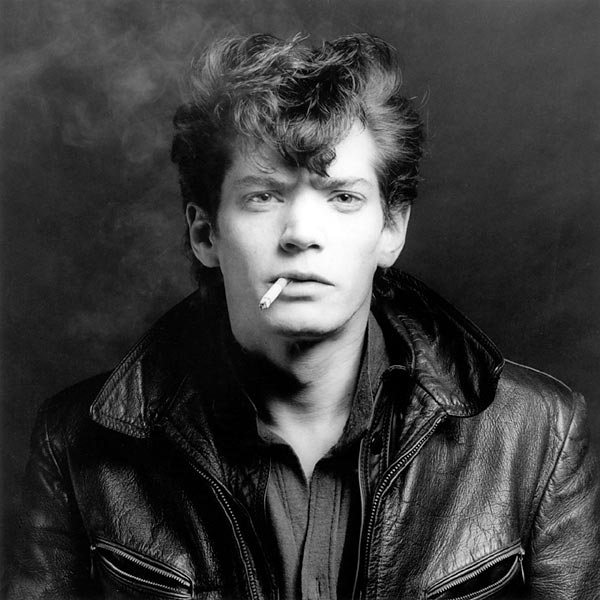
“I don’t know why my pictures come out looking so good. I just don’t get it.”
“I just want to be written about as a normal artist.”
“I recorded that because it happened to me. I wasn’t making a point.”
“I don’t think any collector knows his true motivation.”
“I played around with the flowers and the lighting, so that was a good way to educate myself.”
“I wish I could be elegant.”
“I’m not a photojournalist.”
“If I am at a party, I want to be at the party. Too many photographers use the camera to avoid participating in things. They become professional observers.”
“My lifestyle is bizarre, but the only thing you need to know is where the darkroom is.”
“One must ease the public into it – that’s an art in itself.”
“The more pictures you see, the better you are as a photographer.”
“The photographs that are art have to be separated from the rest – then preserved.”
“To make pictures big is to make them more powerful.”
“Whenever you make love to someone, there should be three people involved – you, the other person, and the devil.”
“With photography, you zero in; you put a lot of energy into short moments, and then you go on to the next thing.”
Helsinki
 Helsinki
Helsinki
by Peter Richards
Action Books, 2011
90 pages / $16.00 Buy from Action Books
Rating: 8.0
The interlocking poems of Peter Richard’s Helsinki pleasure the reader by taking a deviated, scenic route, rather than getting straight to the point. Disregarding individual poem titles and punctuation (except for apostrophes), the poems become a labyrinth — ritually switching subject matters, physical settings and places in time. There’s even an element of multiplicity with the speaker, undertaking different roles across the terrain of the book: a lover, a solider, etc:
“We each appear indelible visible / precisely as ourselves but in the way / letters in a name might come oddly assorted I never fully wore the skin / of my name as when seeing my name / pass in that way forever staring down …”
With reckless line breaks, unyielding sentences, and a lack of punctuation to serve as a guide for how to read and when to stop and take a breath, there are moments in Helsinki where the poems can be difficult, seemingly almost inaccessible. This isn’t an easy book; this shouldn’t deter readers, though. Richards is a talented writer: with an affinity for gnarly diction, he is able to aptly and swiftly go from one off-the-wall surreal scene to another within a few lines in a poem:
“My tube was never removed so this painting depicts / the continuation of sound passing through one boundary / wall to the next on and out into space where I still have / a more or less decent view of the villa though it looks small”
Memory and recollection are thematically crucial as well. The speaker (or perhaps speakers?) is unsure where to the draw line differentiating between a past memory, a dream, and something this present sense of the world: “When I came to it was a place impossible / to distinguish from the place in my sleep.” And perhaps that’s the most attractive element of the book: being thrown into an unstable literary landscape that undergoes constant metamorphosis. Helsinki is dynamic. It’s an “endless architecture,” one that spirals and swirls into many places, trying to accomplish a difficult task for itself:
“woe to be counted when a mountain with so many / unburdens itself hearing cries from the buried ones / failing inside a mouth clogged with it recalls my own / failure to ever capture in words the whitened season”
August 17th, 2011 / 12:06 pm
Taco
Likes: Seeing someone with authentic bounce in their step (00.9, 0.49). Initial 3-pointer is to go over 110 points, thus granting free tacos for fans. Rodman’s houses never had furniture, only a mattress (though he already owns the coffin he will be buried in and sometimes sleeps in it) and a giant TV to watch game tapes. (He obsessively studied trends on where an individual player’s missed shots tended to bounce.) Announcer goes with Mexican food puns. Rodman’s friends know him as shy. He once married himself. In midst of this 3-pointer run, Rodman plays excellent D (1:06), causing near air-ball. This quote on a phone call he received while gambling at a casino.
“It was like the ‘somebody died call’. I picked up the phone and Madonna was like, ‘I’m ovulating, I’m ovulating. Get your ass up here’. So I left my chips on the table, flew five hours to New York and did my thing. We got done and she was standing on her head in an attempt to promote conception — just like any girl trying to get pregnant. I flew back to Las Vegas and picked up my game where I left off.”
Dislikes: Pick or scratch at 31? Ref should have said ‘fuck it’ and gave Rodman last 3. Pippen’s black belt with brown suit. (Wish we could see his shoes and get a significant argument going.)
Books Without Covers
“The Internet” by Eric Amling
Here are the names of some manuscripts I’m reading with observations about the content of each manuscript and sample poems (the picture above has nothing to do with this post, except that it’s a collage by Eric Amling that I like). It would be rad if other people blurbed about manuscripts they are reading (their own or their friends or whatever). Feel free to share poems from other unpublished manuscripts in the comments. Also, if any publishers would like to contact the poets mentioned in this post in order to read their manuscripts for possible publication, please let me know and I’ll forward your requests to them.
This Wells Tower essay about traveling in Iceland and Greenland with his father and brother is one of the best things you will read this week (and beyond). Also, consider voting for American Short Fiction’s SXSW Interactive panel.
Nicholson Baker’s House of Holes Style Sheet
Deadspin has published the style sheet from Nicholson Baker’s latest, House of Holes, a self-proclaimed “Book of Raunch.”
Here are the As & Bs:
a-holes (38)
assbones (44)
assbuns (199)
asscheek (33)
assclenching (200)
asscrack (239)
assfucking (175)
ass jeans (240; see query)
assjunk (180)
ass pants (241; see query)
assplay (224)
ass-slappy (220)
ass-squeezer (27)
asstrunk (180)
asswood (57) READ MORE >


